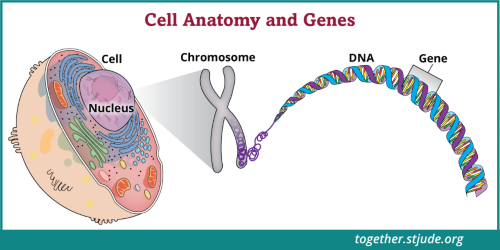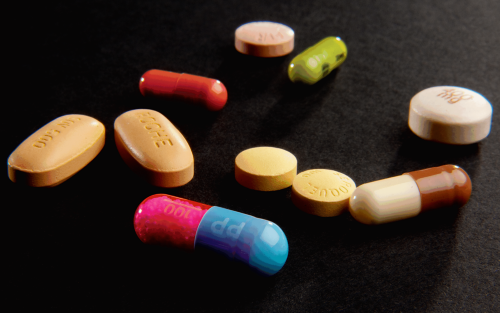Targeted therapies are newer types of drugs that act on, or target, specific features of cancer cells. Targeted therapy is sometimes called molecularly targeted therapy or precision medicine. Each targeted drug acts on a certain aspect of cancer cell function. These medicines are a major focus of current research in childhood cancer treatment.
How does targeted therapy work?
Cancer cells are different from normal, healthy cells. They have changes in the genes and proteins that tell the cell how to function. Targeted therapy uses these mutations to interfere with how cancer cells grow, divide, or spread.
Depending on the type of targeted therapy, the drug may act on molecules:
- On the outside of the cancer cell membrane where it receives messages from other cells.
- Within the cytoplasm of the cancer cell where most cell activity take place.
- In the nucleus of the cancer cell where genetic information is stored and cell function is controlled.
- On blood vessel cells that “feed” tumor cells.
A targeted drug may block the signals that tell a cancer cell what to do. Or, a drug may change the way a cancer cell makes a protein important for cell growth. Some targeted therapies work by stopping blood vessels from supplying oxygen and nutrients to cancer cells. Other targeted therapies may help cause cancer cell death.
No matter the specific target or action, the main goal of targeted therapy is to disrupt the function of cancer cells so they can’t grow and survive.
How is targeted therapy used?
Targeted therapy may be used to treat a variety of pediatric cancers. Before using a targeted drug, doctors test to see if there are certain genetic changes or mutations in the tumor cell. Doctors may also try a targeted therapy if another treatment has not worked or if cancer has come back.
Targeted therapy may be used alone or with other treatments such as chemotherapy, surgery and radiation therapy. Sometimes, more than one targeted therapy drug may be given.
Targeted therapies are rapidly being developed and tested in different childhood cancers. Most targeted therapies in pediatric cancer are being studied as part of a clinical trial.
Targeted therapies being studied for childhood cancers include:
How is targeted therapy given?
Targeted therapies are medicines usually given by mouth or through an IV. Multiple doses are needed, and most are given to patients on an outpatient basis.
Patients will be monitored to see how well the targeted therapy works. Sometimes, the drug might work at first and then stop working. Side effects are different for each drug, and not all children respond to medicines in the same way. Rarely, people may have allergic reactions to targeted drugs.
Future of targeted therapy in childhood cancer
Targeted therapies hold great promise in treating pediatric cancers, but there is still a lot to learn. Much of the research on targeted therapy has been in adult patients, and doctors need to find out more about how the drugs work in children. For many types of cancers, targeted drugs are not yet available. Cancer cells are complex, and finding the right target is challenging.
Scientists are hopeful that targeted therapy and precision medicine approaches will provide long term cures with fewer side effects for many pediatric cancer patients.




